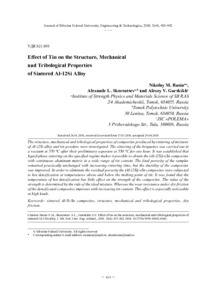Влияние олова на структуру, механические и трибологические свойства спечённого сплава Al-12Si
Скачать файл:
URI (для ссылок/цитирований):
https://elib.sfu-kras.ru/handle/2311/71651Автор:
Русин, Н.М.
Скоренцев, А.Л.
Гурских, А.В.
Rusin, Nikolay M.
Skorentsev, Alexandr L.
Gurskikh, Alexey V.
Дата:
2018-06Журнал:
Журнал Сибирского федерального университета. Техника и технологии. Journal of Siberian Federal University. Engineering & Technologies: 2018 11 (4)Аннотация:
Исследованы структура, механические и трибологические свойства композитов, полученных
спеканием смесей порошков сплава Al-12Si и олова. Спекание брикетов осуществляли в вакууме
при 570 °С после обязательной их выдержки в течение 1 ч при температуре 550 °С. Установлено,
что жидкофазное спекание по указанному режиму позволяет получать композиты (Al-12Si)-
хSn со связанной алюминиевой матрицей в широком диапазоне содержания олова. Конечная
пористость образцов с увеличением длительности их спекания практически не менялась,
но пластичность композитов улучшалась. Для устранения остаточной пористости
композиты (Al-12Si)-хSn были допрессованы при температуре выше и ниже плавления олова.
Обнаружено, что температура допрессовки мало влияет на прочность композитов, и её
величина определяется правилом идеальной смеси. Тогда как износостойкость доуплотнённых
композитов при сухом трении, наоборот, улучшается с ростом содержания в них олова,
особенно это заметно при больших нагрузках The structure, mechanical and tribological properties of composites produced by sintering of mixtures
of Al-12Si alloy and tin powders were investigated. The sintering of the briquettes was carried out in
a vacuum at 570 °С after their preliminary exposure at 550 °С for one hour. It was established that
liquid-phase sintering on the specified regime makes it possible to obtain the (Al-12Si)-xSn composites
with continuous aluminum matrix in a wide range of tin content. The final porosity of the samples
remained practically unchanged with increasing sintering time, but the ductility of the composites
was improved. In order to eliminate the residual porosity the (Al-12Si)-xSn composites were subjected
to hot densification at temperatures above and below the melting point of tin. It was found that the
temperature of hot densification has little effect on the strength of the composites. The value of the
strength is determined by the rule of the ideal mixture. Whereas the wear resistance under dry friction
of the densificated composites improves with increasing tin content. This effect is especially noticeable
at high loads

